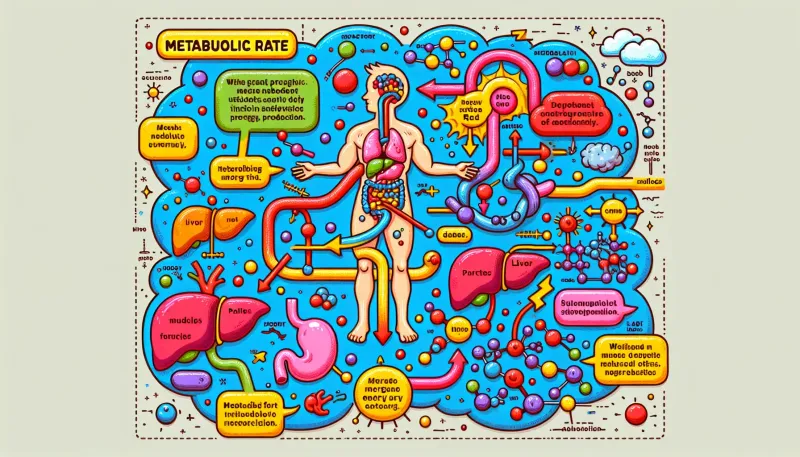What is Metabolic Rate? A Comprehensive Definition

A detailed exploration of the metabolic rate definition, covering its significance, factors influencing it, and ways to optimize metabolic health.
Your metabolic rate is a fundamental aspect of your overall health. Understanding its definition, the factors affecting it, and how you can optimize your metabolism can be beneficial for maintaining a healthy lifestyle. This article aims to provide an in-depth look at the metabolic rate, its importance, and practical ways to influence it positively.
Understanding Metabolic Rate
The term "metabolic rate" refers to the rate at which your body expends energy or burns calories. Essentially, it is the speed at which your body's metabolic processes, including the biochemical reactions and physical activities, consume energy. This energy is derived from the food and drinks consumed, which are then converted into energy through metabolism.
Basal Metabolic Rate (BMR)
One significant component of metabolic rate is the Basal Metabolic Rate (BMR). BMR represents the number of calories your body needs to perform the most basic life-sustaining functions, such as breathing, circulating blood, and maintaining body temperature, while at rest. Typically, BMR accounts for the largest portion of total energy expenditure, about 60-70%, and can vary significantly among individuals based on several factors, including age, sex, weight, and genetics.
Resting Metabolic Rate (RMR)
Resting Metabolic Rate (RMR) is similar to BMR but slightly different. RMR refers to the number of calories your body burns while at rest but also includes the energy expended for a small amount of additional activities like eating and minor movements. While both measures provide insight into how your body uses energy at rest, RMR is often easier to measure and is commonly used in metabolic studies and health assessments.
Factors Influencing Metabolic Rate
Several factors influence your metabolic rate, and understanding these can help you manage and optimize your metabolism more effectively.
Age
Metabolic rate typically decreases with age. As people get older, they tend to lose muscle mass and gain fat, which leads to a slower metabolism. Engaging in regular physical activity and strength training can help mitigate this decline.
Sex
Males generally have a higher metabolic rate than females due to a higher proportion of muscle mass. Muscle tissues burn more calories at rest compared to fat tissues.
Body Composition
Individuals with higher muscle mass have a higher metabolic rate. Since muscle consumes more energy than fat, increasing lean muscle through resistance training can boost your metabolism.
Genetics
Genetics play a significant role in determining metabolic rate. Some individuals have a naturally higher or lower metabolic rate due to inherited traits.
Physical Activity
Active individuals generally have a higher metabolic rate due to the increased energy expenditure from exercise. Both aerobic exercises and strength training are effective in boosting metabolism.
Diet
The type and frequency of food intake play a crucial role in metabolic rate. Eating small, frequent meals can keep your metabolism active throughout the day. Protein-rich foods require more energy for digestion, thus increasing the metabolic rate slightly. Conversely, prolonged calorie restriction can lower metabolic rate as the body adapts to conserve energy.
Measuring Metabolic Rate
Understanding your metabolic rate can be beneficial for personal health management. There are several methods to measure your metabolic rate:
Direct Calorimetry
This method involves measuring the amount of heat the body emits to estimate energy expenditure. It is highly accurate but requires specialized equipment and is often conducted in laboratory settings.
Indirect Calorimetry
Indirect calorimetry is a more common method and involves measuring oxygen consumption and carbon dioxide production, reflecting the energy expended through respiration. This method is often used in clinical and research settings.
Predictive Equations
Several predictive equations estimate BMR or RMR based on factors such as age, sex, weight, and height. Common equations include the Harris-Benedict Equation, Mifflin-St Jeor Equation, and Katch-McArdle Formula. While these equations provide estimates, individual variations mean they might not be entirely accurate for everyone.
Optimizing Metabolic Rate
While many factors influencing metabolic rate are beyond your control, there are several strategies to optimize and boost your metabolism:
Regular Exercise
Engaging in regular physical activities, including both aerobic exercises and strength training, increases energy expenditure and helps build muscle mass. Muscle tissue burns more calories than fat tissue, even at rest, contributing to a higher metabolic rate.
Balanced Diet
Consuming a balanced diet that includes a mix of macronutrients (carbohydrates, proteins, and fats) can support a healthy metabolism. Protein-rich foods, in particular, require more energy to digest and can temporarily boost metabolism.
Stay Hydrated
Water is essential for metabolic processes. Staying hydrated can help maintain a healthy metabolism and support bodily functions.
Adequate Sleep
Quality sleep is crucial for metabolic health. Poor sleep can disrupt hormonal balance and metabolism, leading to increased appetite and potential weight gain. Aim for 7-9 hours of sleep per night.
Avoid Prolonged Caloric Restriction
While weight loss often involves reducing calorie intake, prolonged severe calorie restriction can lower metabolic rate as the body adapts to conserve energy. It is important to approach weight loss with a balanced, sustainable strategy.
Conclusion
Understanding the metabolic rate and its importance in overall health can empower you to make informed decisions about your lifestyle. While several factors influence metabolic rate, including genetics, age, and sex, many aspects can be managed through regular exercise, a balanced diet, adequate sleep, and hydration. By taking proactive steps to optimize your metabolic rate, you can support your long-term health and well-being.



























